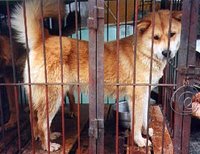The article is called, "Chindo Dogs on American Death Row". The background info, I can accept: A Korean breed of dog, called the Chindo after the island it originated from, is so well-loved that it is an official national treasure. Some Koreans in the US and US servicemen (service-people?) brought the dog to the US. Now there are more Chindo than homes for them and some are ending up in shelters. Why do they end up in shelters? Because, like many purebreeds (the Dalmatian is a good example), the Chindo does many things well but is not really a cuddly house pet for city-folk.
Part of the problem or outrage felt by Koreans may be because the dogs are legally protected in Korea.
Okay, that's the background.
Let's see the third paragraph:
But, each year in the U.S. hundreds are either turned out, literally dumped, or given up by their owners, inviting certain death in ``kill'' shelters where animals are quickly euthanized if new homes cannot be found.We will see the phrase "kill shelters" many more times. You may wonder about 'kill shelters' and the certain death they house. Later in the article, we get a definition of sorts:
...many of the Los Angeles County shelters are ``high-kill'' shelters in which Jorgensen said dogs ``generally have three days to be adopted before they are euthanized.'' Many do not leave alive.
I have just learned that at the Toronto Humane Society, "No animal is ever euthanized due to lack of space or because the animal has simply “been here too long.”, which surprised me because I thought three days was the typical garranteed stay for animals and as space was needed, longer-term guests might be euthanized. Still, that is the Humane Society. There are other shelters and they are trying to help the situation. I don't particularly blame the doctor for the cancer that killed my father. To blame the shelters is crazy.
There is one specific case described and it involved a US serviceman:
...the eight-year-old chindo was adopted in Korea by a U.S. serviceman who later raised it in the U.S. It grew up on military bases, including Fort Bragg, just west of Fayetteville, N.C., before being flown to Afghanistan when its owner was posted there. However, the dog ``was not welcome there so he was flown home to Pennsylvania and has been taken care of by the owner's parents.'' The dog has since been surrendered to the shelter because the soldier's parents are no longer able to care for it. The soldier is said to be on his second tour of duty in Afghanistan.
Firstly, all the best to the serviceman involved. Come home safe.
This is where my claim of hypocrisy comes in. Koreans may wonder why the parents couldn't care for the dog. They may think, "Was it too hard to carry food and water to the one meter by one meter by one meter cage the dog is just-naturally kept in?" QUALITY OF LIFE, PEOPLE! Sorry to shout but I get sick seeing almost every dog on a one meter line or in a small cage for their entire life.
The article comes with a picture that seems to prove me wrong but really shows the only two dogs in all of Korea that have some freedom.


(from the article)..............................(link)
While I type this, the neighbor's tiny dog yaps constantly because it's owners are away. The dog does this all day, everyday. Now, it isn't a wonderful Chindo but it is a living thing. I feel all dogs should be walked by their owners for exercise daily and I don't see many Koreans doing that.
The chindo is described as a hunting dog in the article:
``They don't understand the traits of the chindos, and because of it, they are sometimes attacked. So, as the reputation of these dogs grows around the world, it is necessary to properly inform people of the traits of the chindos. If owners keep in mind certain things the dogs would be their best pet.'' Park Byung-chul believes, ``Americans view chindo dogs as animals that bite easily and then because of it, they tend to not like [them]. Koreans, on the other hand, most value [their] loyalty. Obviously, the dogs have negative traits like hunting instincts. However, if chindo dogs are raised alone and not in a group as they should be, there would be no problems in raising [them].''
Where to start? First most Koreans dogs seem to be raised alone - again, in their own private cages.
We read that Chindo sometimes attack their owners but later, "...the overall impression they give is one of gentleness..."
As I said at the beginning, I don't know if I did the article justice. I guess I am most displeased by the 'Those horrible Americans" theme when little blame for the admittedly bad situation of having the unwanted dogs put down is given to the Koreans who own most of the dogs.




6 comments:
Americans also don't beat their animals to death in the belief that eating an animal killed slowly and violently will increase their stamina.
Please don't be fooled by what you read...the Toronto Humane Society DOES euthanize animals! They killed my baby Robin. As a staff member that has been on strike for 5 months I can tell you it's not their only lie.
Chindo/Jindo dogs are vicious and half wild. One attacked my dog, unprovoked, and almost killed her. Tore 1/2 the skin off her body. Until this breed has some of the "wildness" breed out of it these things will continue to happen.
"...poor research, ridiculously loaded terminology and especially stunning hypocrisy..." Really? I guess you didn't do the article justice. All I seemed to be reading in your post was your own biases and preconceptions about Korean/foreigner relations and how you assumed them to be reflected in this article, as in your alleged "'Those horrible Americans' theme". Sorry, you didn't sell me on that.
Neither does your response really add any new information to counter the info article other than a phone call you made to the Toronto Humane Society, which has nothing to do with the previously mentioned L.A. county animal shelters. Talk about the pot calling the kettle black regarding poor reporting.
Anon # 3:
Could you give a specific point where I am in the wrong or being hypocritical?
Before I go any further, it's been a while but I didn't call the Toronto Humane Society- my information is likely from their website. This is one point that I am simply correcting you rather than trying to argue a point.
I'm entirely comfortable saying that Korea has a love/hate relationship with the US. Is this the hypocritical part? I am Canadian and we have a different sort of love/hate relationship with the US but I don't that's relevant to this argument.
I am entirely comfortable saying that there are too many dogs in small cages here. I did exaggerate when saying the dog in the photo was the only one to be able to run free, but there are many cage-bound chindo (and other dogs) in this country (Korea).
Regarding 'Loaded terminology' - calling the shelters 'kill shelters' is pretty loaded - I am comfortable saying that. It isn't the fault of the shelter that they are overwhelmed and need to kill the dogs after a period of time has passed.
Yeah, I don't know what you are complaining about. Give me details - and use some sort of name when you do - I don't need your real name, but I don't think the three anonymous comments are by the same person.
If it matters, I am now 'surprises aplenty' and I was 'kwandongbrian'. I took the 'kwandong...' name because I worked at that university. As I no longer do, I changed my name. You could probably find my real name on this blog, but I don't see any reason to do so.
I do apologize that the link has died. I will fix it soon as a fellow blogger also posted about the article and treatment of dogs in Korea.
http://briandeutsch.blogspot.com/2008/02/jindo-dog-forgotten-cultural-property.html
NOPE: his link is dead, too. Still, he does quote other parts of the original. I am honestly sorry that the original article is missing.
Post a Comment